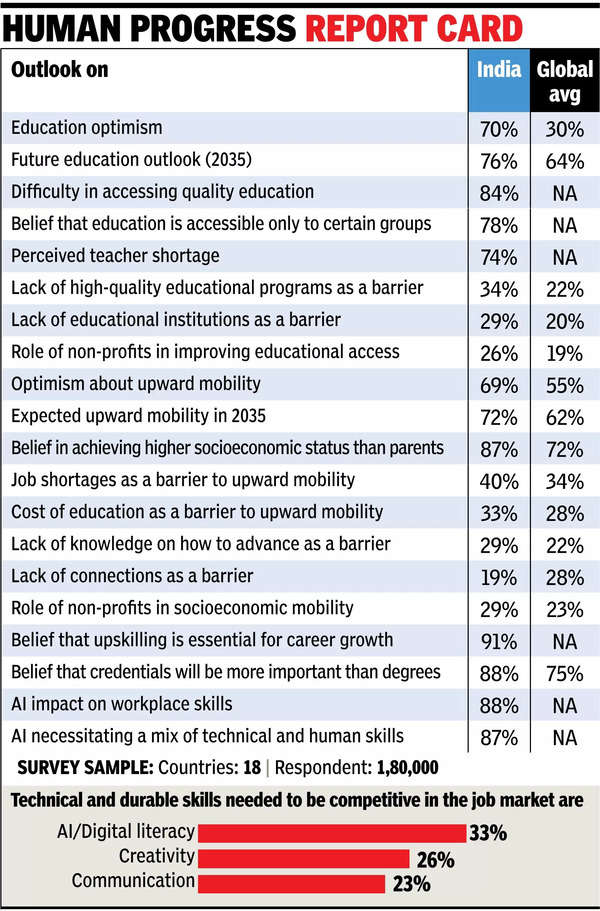NEW DELHI: India has emerged as one of the most optimistic nations regarding education and socioeconomic mobility. The latest Educational Testing Service (ETS) Human Progress Report, released in India Tuesday, conducted across 18 countries, underscored that India’s optimism about its education system stands in stark contrast to the global sentiment. However, challenges in accessibility and teacher availability persist.
While only 30% of respondents worldwide expressed optimism about their country’s current education status, 70% of Indians held a positive outlook. Similarly, confidence in future improvements is higher in India at 76% compared to the global average of 64%. Despite this optimism, a significant portion of the Indian population recognises systemic challenges – 84% of respondents believe accessing quality education remains difficult, and 78% acknowledge that educational opportunities are skewed toward certain privileged groups. Furthermore, 74% pointed to a shortage of teachers, highlighting a major bottleneck in India’s educational progress.

Compared to the global average, Indians more frequently cited the lack of high-quality educational programmes (34% vs 22%) and institutions (29% vs 20%) as barriers. India is one of the most favourable countries toward non-profit organisations, with 26% agreeing that non-profits can play a role in improving access to high-quality education, compared to 19% globally.
India’s confidence extends beyond education into the realm of socioeconomic mobility. Nearly 69% of Indians believe in their current opportunities for upward mobility, compared to a global average of 55%. Looking ahead to 2035, 72% expect improvements, compared to 62% in other countries.
However, economic barriers persist. More Indians than their global counterparts cited job shortages (40% vs 34%), expensive education (33% vs 28%), and lack of advancement knowledge (29% vs 22%) as key hurdles. Notably, fewer Indians (19%) felt that a lack of connections hindered their opportunities, compared to the global average of 28%.
Amit Sevak, CEO of ETS, said: “India has made impressive strides in foundational learning, but disparities persist between urban and rural areas and across states. One of the biggest factors influencing student outcomes is teacher quality.”
India’s workforce is rapidly adapting to new skill requirements, with upskilling becoming a widely accepted necessity. About 91% of Indians believe lifelong learning will become a career standard, significantly higher than the global norm. Moreover, 88% anticipate that credentials and certifications will gain more importance than university degrees in the coming years, compared to 75% worldwide. The influence of artificial intelligence (AI) on the job market is a major concern, with 88% of Indians recognising its transformative impact on essential skills. Notably, Indians foresee AI as a complementary tool rather than a threat, with widespread belief that those who integrate AI into their work will replace those who do not.
India’s high optimism on education and career growth contrasts with more tempered global perspectives. While the country acknowledges significant challenges in accessibility and infrastructure, its population remains committed to skill development and career advancement.
The findings also underscore the role of non-profits and govt partnerships in addressing existing gaps. With initiatives supporting skill assessments, teacher quality improvement, and AI integration in learning, India appears poised to navigate these challenges effectively.
